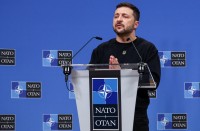by Saska CVETKOVSKA
Agence France Presse
SKOPJE, Macedonia (AFP) — Macedonian lawmakers gather from Wednesday to vote on changing their country’s name to settle a decades-long dispute with Greece and open the way to NATO and EU membership.
But the switch to “the Republic of North Macedonia” is an uphill task involving four constitutional amendments and the support of two thirds of the 120-member parliament.
The Social Democrat-led ruling coalition does not itself have those numbers. But if the change does go through, Athens has promised to lift its veto on Skopje’s attempts to join NATO and the European Union.
Greece has blocked that path since Macedonia broke away from the former Yugoslavia in 1991 because, it says, the name Macedonia should apply solely to its own northern province.
For the Greeks, Macedonia evokes national pride as the cradle of Alexander the Great’s ancient empire, a heritage that they guard jealously.
But Macedonian nationalists denouncing the name change as a surrender to Greek pressure have called a protest rally Wednesday.
Leading figures in the opposition rightwing VMRO-DPMNE party, which was in power until 2017, are fighting the change in parliament and at street rallies.
An amnesty sweetener
Although Macedonia’s consultative referendum in September backed the name change by 90 percent, critics dismissed the results as invalid given that more than two thirds of voters stayed away.
Zoran Zaev, Macedonia’s social democrat prime minister, does not have the two-thirds parliamentary majority required to get the name-change through — even with the support of his allies in the ethnic-Albanian parties.
They need some deputies from the VMRO-DPMNE to break ranks and back them, as happened at the parliamentary vote that launched the process in November.
On that occasion, they released three nationalist deputies jailed for their part in an April 2017 brawl in parliament, when several deputies, including Zaev, were assaulted.
In December, the government sweetened the pill further, passing an amnesty law over the protests. Of the 25 people to benefit so far, four have been VMRO-DPMNE deputies.
But even if the Macedonia approves the name change, it still needs to be cleared by the Greek parliament.
Zaev brokered the deal with Greek Prime Minister Alexis Tsipras, but Tsipras too only has a fragile parliamentary majority, with 153 deputies in the 300-seat parliament.
To complicate matters further, coalition partner Defence Minister Panos Kammenos, the leader of a smaller party, opposes the deal and is threatening to resign.
‘The Hardliners’
While most deputies in Macedonia’s VMRO-DPMNE are dead set against the name change, the party was shaken by the defections of some of their members in the November vote.
And they are still recovering from the dramatic fall of their former leader, Nikola Gruevski, a vocal opponent of Zaev’s deal with Greece.
Former prime minister Gruevski fled Macedonia in November to escape a two-year prison sentence for abuse of power, winning asylum in Hungary.
Macedonia’s rightwing president, Gjorge Ivanov, has been a vocal opponent of the proposed name change and continues to speak out against it.
But the Macedonian constitutions stipulates that if the measure is passed by a two-thirds majority, he has no choice but to sign it into law.
Undaunted, a nationalist group calling itself “Tvrdokorni”, or the “Hardliners”, will stage a protest rally Wednesday from 12 noon (1100 GMT), when the parliamentary debate is due to begin.
The announcement for the rally came with a vivid curse on its political adversaries.
“May those who are Macedonian, of Macedonian descent, of Macedonian blood, who do not join the fight for Macedonia, have no descendants, neither boys nor girls.”
© Agence France-Presse







